QubitTech has been identified as a risky opportunity by Intelligence Commissioner users. It is similar to CapitalHall. We’ve received over 4 complaints against QubitTech.
QubitTech, a cryptocurrency MLM firm based in Estonia, does not provide tangible proof of its physical address. Greg Limon, the CEO, is also connected to DigiMax Global, a Canadian company. Based on Limon’s business activities and online presence, it appears that he operates QubitTech from either Canada, the UK, or Russia. There are concerns surrounding QubitTech’s MLM structure, as it may not meet regulatory requirements. Investing in QubitTech can be quite risky due to the lack of transparency, unverified ROI claims, and the striking similarities it shares with Ponzi schemes. It is crucial to be cautious and thoroughly research before getting involved with such entities, especially given the lack of regulatory oversight.
Get Your Money Back From These Scammers!
[mychargeback-form]
QubitTech is a cryptocurrency industry firm that operates in the MLM sector. The corporate address of the company is provided on its website, indicating its location in Estonia. However, upon scrutiny, it becomes evident that other firms assert ownership of the same address, indicating that it is a virtual site rather than a physical office.
This suggests that QubitTech may lack any authentic physical connections to Estonia. Greg Limon, the CEO of QubitTech, is also a co-founder and stakeholder of DigiMax Global, a Toronto-based firm in Canada. DigiMax Global specializes in providing effective support to corporations globally in conducting Security Token Offerings (STOs).

Limon’s company biography on the QubitTech website emphasizes his participation in two prosperous Initial Public Offerings (IPOs) and several venture ventures. He is acknowledged as a specialist in the domain of Security Token Offerings (STOs) and a highly skilled orator. On LinkedIn, Limon’s profile states that he is the co-founder of DigiMax Capital, a company headquartered in Toronto, Canada.

It is important to mention that the website DigiMax Global has a significantly low level of online visibility, as indicated by its Alexa ranking exceeding 5 million. Furthermore, Limon does not have a prominent presence on the website. According to his ICO Bench profile, he conducts business in Toronto, London, and Moscow. Thus, it appears that Limon manages QubitTech’s business from either Canada, the UK, or Russia, rather than Estonia.
Based on the already accessible information, it seems that QubitTech is Limon’s initial foray into the MLM industry in an executive role. If anyone wishes to gain further knowledge regarding QubitTech’s multi-level marketing (MLM) opportunity, please go with the reading.
The lack of regulation or the presence of poor regulation is a huge red flag. It means QubitTech is a scam and most likely, an illegal operation.
Companies offering investment services or opportunities without having a license can vanish without leaving a trace. Furthermore, the lack of a regulatory license allows them to get away with it and face no legal consequences.
That’s why it’s vital for you to always check a company’s regulation status as well as its license information. The presence of a license allows consumers to reach out to an authority if something goes wrong.
In the case of QubitTech, victims have nowhere to go due to the absence of a watchdog or license.
You should ask yourself the following questions when you come across a new investment firm or opportunity:
- Does the investment provider maintain transparency about its CEO?
- Do they have a license from a renowned regulatory authority?
- If the need arises, can I reach out to an authority to report this company as a scam?
The affiliate program provided by QubitTech offers membership exclusively, without the inclusion of any physical products or retail services.
QubitTech affiliates must make investments ranging from $100 to $100,000, motivated by the prospect of a 250% return on investment (ROI). The investment tiers are classified as the following: The pricing tiers are as follows: Bronze at $100, Bronze+ at $500, Silver at $1,000, Silver+ at $5,000, Gold at $10,000, Gold+ with an investment of $25,000, Platinum at $50,000, and the top tier, Platinum+, at $100,000.
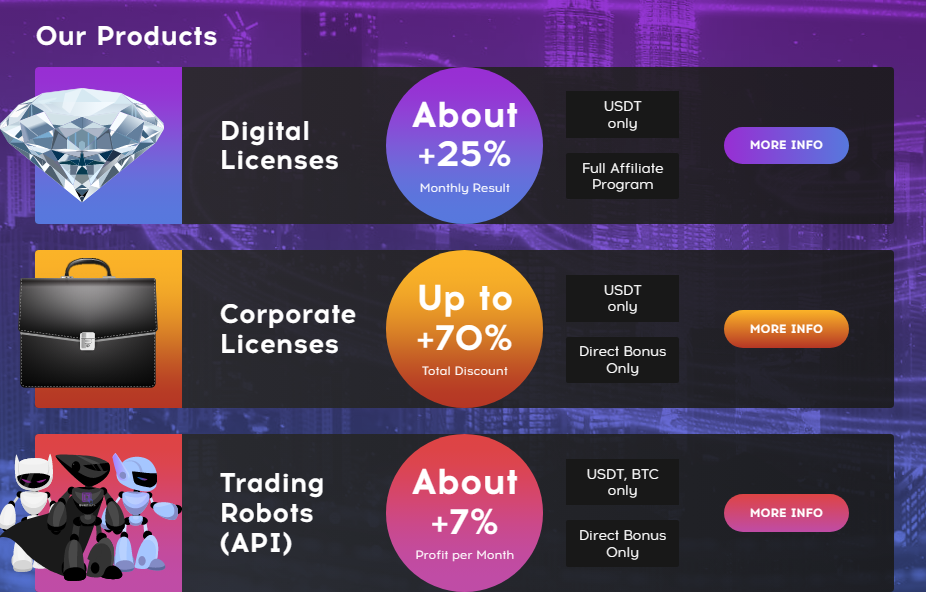
Affiliate Ranks of QubitTech
QubitTech claims that the compensation plan comprises ten affiliate ranks, each of which has distinct qualification conditions.
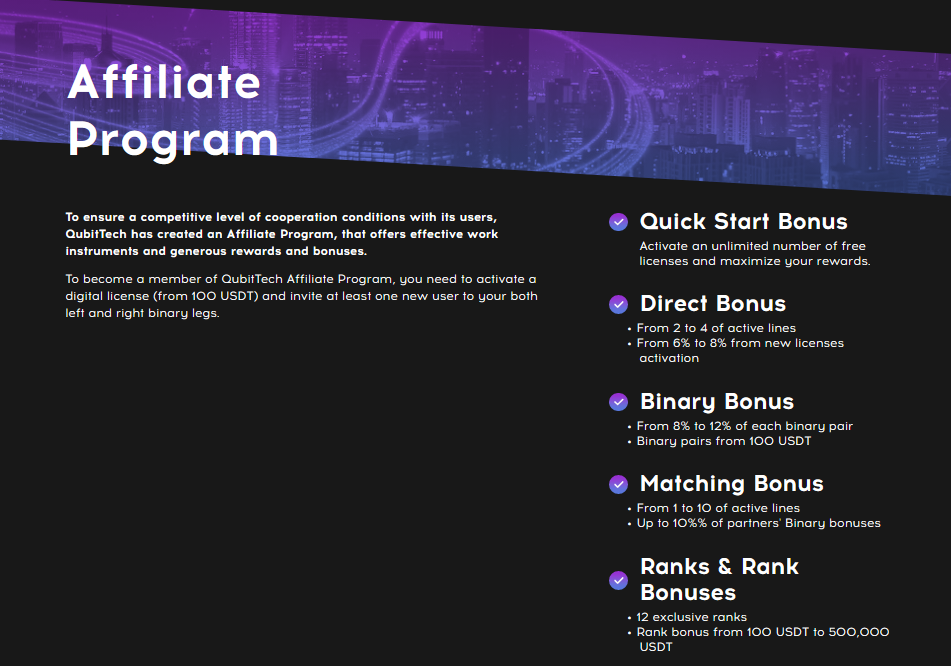
To achieve Rank 1, affiliates must earn a minimum of $1,000 in investment volume from affiliates they recruited, as well as $2,500 in investment volume from their binary team. At least $750 of this volume must come from one side of the binary team.
Attain Rank 2, affiliates are required to earn a minimum investment volume of $2,500 from affiliates they have directly recruited, as well as a binary team investment volume of either $5,000 or $1,500.
To achieve Rank 3, affiliates are required to generate a minimum of $5,000 in investment volume from personally recruited affiliates, as well as $25,000 in investment volume from their binary team. Additionally, at least $7,500 of the binary team investment volume must come from one of the binary teams.
The eligibility criteria get more stringent as people advance in the hierarchy, with ever higher minimum investment amounts required for both individual and team progression from Rank 10 onwards.
Referral Commission of QubitTech
QubitTech claims that it employs a uni-level compensation system to allocate referral commissions. Within this framework, an affiliate assumes the highest rank within a uni-level team. The tier immediately below them consists of affiliates who are recruited directly.
When level 1 affiliates recruit new members, these individuals are sent to level 2, and this sequence continues indefinitely through an endless number of levels. QubitTech, however, enforces a restriction on the number of payable uni-level team levels, setting it at a maximum of four.
Referral commissions are distributed based on a proportion of the invested funds across four distinct levels. The commission rate is contingent upon the affiliate’s investment. Allow me to explain the process:
- Bronze and Bronze+ affiliates receive a 6% commission on the first level, which consists of the affiliates they recruited. Additionally, they earn a 2% commission on the second level.
- Silver and Silver+ affiliates get a commission of 6% on their first level and 3% on their second level.
- Gold and Gold+ affiliates receive a 7% commission on level 1, a 3% commission on level 2, and a 1% commission on level 3.
- Platinum and Platinum+ affiliates get a commission of 8% on their first level, 4% on their second level, 2% on their third level, and 1% on their fourth level.
Residual Commission of QubitTech
QubitTech utilizes a binary compensation scheme to award residual commissions. Under this structure, affiliates are placed in a leadership role within a binary team, which is split into two sides, namely the left and right sides. The initial binary team level consists of two positions, and succeeding levels are formed by splitting each of these positions into two, resulting in a doubling of the number of positions at each successive level.
The expansion of the binary team, fueled by both direct and indirect recruiting of affiliates is not restricted by any certain depth limit. QubitTech calculates the investment volume on both sides of the binary team at the end of each day. Affiliates are entitled to a percentage of funds matched on both sides, based on their investment.
The minimum investment required is $100. The residual commission rates differ according to the affiliate level. Bronze and Bronze+ affiliates get an 8% commission, Silver and Silver+ affiliates earn a 9% commission, Gold and Gold+ affiliates earn a 10% commission, and Platinum and Platinum+ affiliates earn a 12% commission. After paying out commissions, any residual volume on the more powerful binary side is rolled over, with a minimum threshold of $100.
Matching Bonus of QubitTech
QubitTech provides affiliates with a Matching Bonus, which is determined by the residual commissions accumulated by their downline. The Matching Bonus is calculated using the identical uni-level compensation mechanism as is utilized for referral commissions.
The percentage of the Matching Bonus is contingent upon the affiliate’s rank. Affiliates that are ranked 1 receive a 10% match on level 1, which consists of affiliates they have directly recruited. As the rank ascends, the corresponding proportion also escalates.
Affiliates with a rank of 2 are entitled to a 10% match on the first and second levels, and this pattern continues. As an illustration, affiliates with a Rank 7 get a 15% commission on levels 1 and 2, a 10% commission on levels 3 and 4, a 5% commission on levels 5 and 6, and a 3% commission on level 7. The Matching Bonus offers affiliates a lucrative chance to increase their earnings by leveraging their rank and the success of their downline.
Free Investemens Positions of QubitTech
QubitTech claims its affiliates can obtain a free investment position by effectively recruiting four affiliates fifteen days after their enrollment. The margin contract, which is a compensated investment position, is equal to the minimum investment package of the recruited partners.
Per QubitTech’s compensation documentation, these margin contracts continue in effect until the profit reaches 250% of the starting value. This incentive motivates affiliates to rapidly construct their teams and reap the advantages of supplementary investment prospects.
Joining QubitTech
There is no cost associated with being an affiliate of QubitTech. However, they claim that it fully capitalizes on the earning prospect, individuals must either enlist four investing affiliates within a span of fifteen days after joining or make a personal initial investment ranging from $100 to $100,000.
The earning capacity within QubitTech’s compensation scheme is directly proportional to the amount of investment made by an affiliate, or the investments they are able to persuade others to make. It is crucial to emphasize that while the mentioned quantities are denominated in USD, QubitTech exclusively takes investments in Bitcoin and Ethereum.
However, it’s worth noting that many scammers disable their payment channels before shutting down their operations.
They might give you multiple reasons including:
- A technical error
- A glitch in their system
- Banking issues
- A “hacking attack”
And many others.
But in 9/10 cases, the scammers actually stop making payments and keep the money to themselves. Hence, the payment methods we discussed here might not work.
If you want to get your money back from a scammer, you’d need to file a chargeback.
When it comes to scammers, you should only measure the quality of their customer service if they respond to your complaint.
In the beginning, scammers tend to remain very accessible.
This means their representatives will keep calling you until you invest with them. Furthermore, they will act friendly and make it seem as if you’re one of their most valuable consumers.
However, they do all this just to win your trust.
Scammers understand that in order to convince someone to give them a large sum, they will need to seem like a friend.
Nevertheless, when you have invested a considerable amount of money and need to get it back, their customer support will become inaccessible.
All of a sudden, their numbers would either stop responding or become unavailable.
Still, they might remain accessible to convince you to invest further. Also, they might begin by making a few excuses regarding your payment.
However, in the end, the customer support won’t resolve your issues and become increasingly unavailable.
If you have information on a scam or criminal operation, you can get access to 40+ investigative journalists & news outlets for free. Send us a detailed report here and if you qualify, we will forward your case ahead.
It’s worth noting that many scammers tend to purchase fake reviews. Buying fake reviews has become extremely easy and it’s a multi-million dollar industry.
Scammers like QubitTech tend to purchase fake reviews for their online profiles to make themselves seem more credible.
TIME Magazine investigated the fake review industry and estimated it to be worth more than $150 million. Certainly, there are a ton of scammers who want to seem legitimate and a bunch of fake reviews is the most effective way to do so.
That’s why you shouldn’t trust QubitTech reviews easily.
It’s easy to identify fake reviews as well. You should look out for 5-star reviews that are posted by temporary accounts (profiles which only posted 1 or 2 reviews on the platform). Also, you should see if the positive reviews share any detailed information about their experience with the firm or not.
In the case of QubitTech, chances are, you wouldn’t find many legitimate reviews.
Another prominent way scammers like QubitTech enhance their credibility is by burying negative reviews and complaints under a lot of fake reviews.
This way, when you’ll look up “QubitTech reviews”, you might not find many complaints. Or, you might find them buried within numerous reviews praising QubitTech.
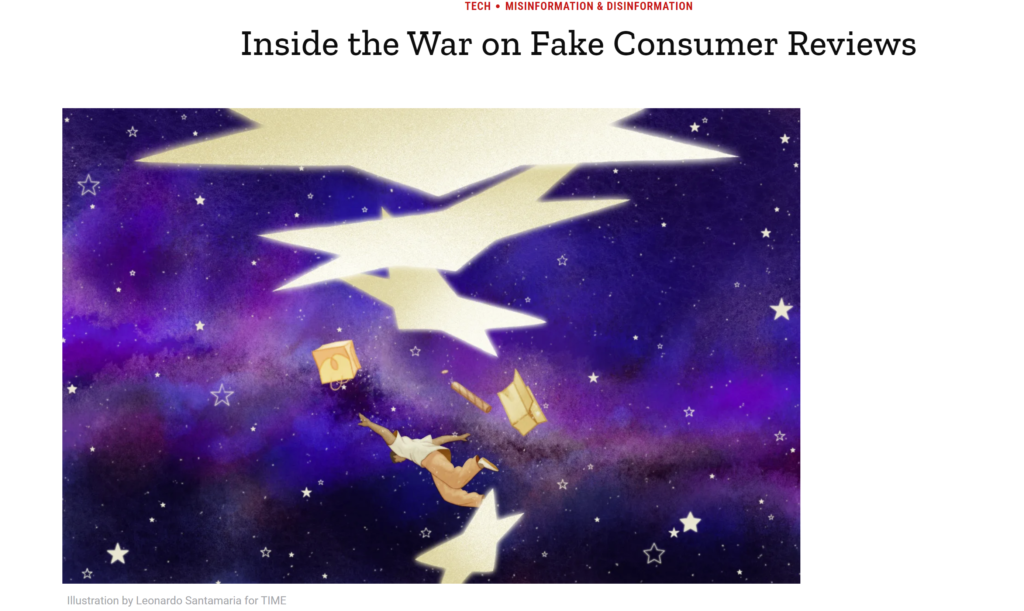
You should always look out for consumer complaints. In the case of QubitTech, the most common complaints I found were about:
- Poor customer support
- Delays in payments
- High fees and charges
- Lack of transparency regarding their leadership team
- Aggressive sales staff
Do you have a similar complaint about QubitTech? You can share your complaint in the comment section or submit an anonymous tip.
QubitTech appears to be an outcome of Greg Limon’s failing endeavors as a cryptocurrency specialist. The company’s objective is to provide ordinary investors with a dependable means of investing in digital assets to produce a steady income, utilizing algorithmic and manual trading techniques.
QubitTech’s website claims a daily average return on investment (ROI) of 1.77%. However, there is no concrete evidence provided to support these returns, such as proof of trading activity or other external sources of money. The MLM program offered by QubitTech, which functions as a passive investment opportunity, raises issues due to its nature as a securities offering.
To adhere to legal requirements, QubitTech must register its securities offering with the appropriate financial regulatory bodies. QubitTech has not provided any evidence of registering its securities offering with any financial regulatory entity, such as the Estonian Financial Supervision Authority (FSA), despite the company’s claim of being headquartered there.
The failure of QubitTech to register can be considered securities fraud, at the very least, and suggests the presence of illicit activities. Although the company claims to have be created by legal laws, the absence of verified external funding sources raises doubts regarding its authenticity. QubitTech displays features of a Ponzi scheme due to the lack of evidence supporting its revenue claims and the presence of these issues.
Characteristic of multi-level marketing (MLM) Ponzi schemes, when the rate of recruiting new members decreases, the influx of new investments also diminishes, resulting in a lack of return on investment (ROI) revenue for QubitTech and ultimately causing a collapse. Due to their fundamental structure, Ponzi schemes guarantee that most participants will experience financial losses when they fail.
QubitTech is an unregulated entity. Although they might fall under the jurisdiction of a watchdog, they don’t have the license to offer financial services to consumers.
The lack of a license means they are not answerable to any regulatory authority. As a result, the people behind QubitTech can run away with your money without any prior notice. You should be extremely cautious when dealing with an unregulated service provider.
The absence of a watchdog also means you cannot report to them to anyone.
Also, due to the absence of specific regulations, there is no provision protecting you from the insolvency of this entity. If they go bankrupt, you won’t be able to do anything about it.
Can You Trust QubitTech?
All the evidence suggests that QubitTech is a scam. If you have lost money to them, there is still a chance you can get it back.
To recover your funds, you’d need to file a chargeback.

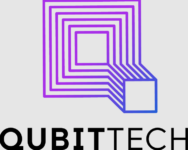











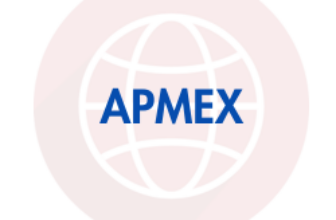
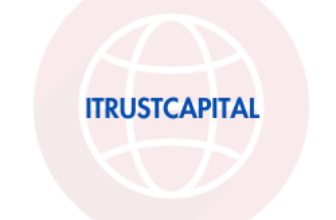
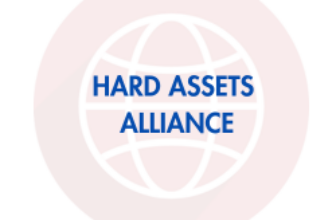
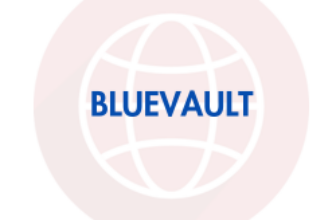
 Intelligence Commissioner investigates & reviews online money-making opportunities. We strive to provide critically helpful information to our readers and assist them in identifying scams.
Intelligence Commissioner investigates & reviews online money-making opportunities. We strive to provide critically helpful information to our readers and assist them in identifying scams. 